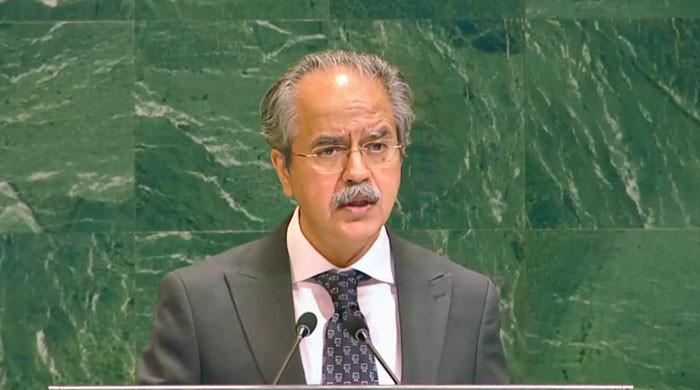Pakistan Urges UN Action Against Terrorism Originating from Afghanistan
Amid escalating concerns over attacks carried out by terrorists based in Afghanistan, Pakistan has appealed to the United Nations to prevent the nation from becoming a haven for terrorism. The Tehreek-e-Taliban Pakistan (TTP) has been identified as a significant global and regional threat.
Addressing a UN General Assembly session focused on the situation in Afghanistan, Pakistan’s Permanent Ambassador to the UN, Asim Iftikhar Ahmad, stated, “We must ensure that Afghanistan does not become a breeding ground for terrorists, posing a threat not only to its neighbors but also to the broader region and beyond.”
The ambassador’s statement reiterates Pakistan’s consistent position against the utilization of Afghan territory by terrorist organizations for launching attacks.
In the previous week, security forces neutralized a group of approximately 30 terrorists, backed by India, as they attempted to infiltrate the border between Pakistan and Afghanistan in North Waziristan, Khyber-Pakhtunkhwa.
Since the return of Taliban governance in Afghanistan in 2021, Pakistan has experienced a rise in cross-border terrorist activities, especially in the provinces bordering Afghanistan, such as Khyber Pakhtunkhwa and Balochistan.
In May 2025, Pakistan observed a slight increase in militant assaults, even as heightened military tensions with neighboring India did not result in a substantial escalation of violence by extremist factions.
A day prior, Islamabad hosted the first round of additional secretary-level talks between the foreign ministries of both countries. Discussions encompassed crucial areas of mutual interest, including trade, transit cooperation, security matters, and connectivity. Both nations acknowledged terrorism as a grave threat to regional stability and peace.
During the discussions, the Pakistani delegation underscored the necessity for tangible measures against terrorist groups operating within Afghanistan, emphasizing that these groups undermine Pakistan’s security and impede regional progress.
Ambassador Iftikhar elaborated on the threat of terrorism originating from Afghanistan, asserting that it poses a severe risk to neighboring countries, particularly Pakistan.
“Daesh is persistently targeting the existing authorities, while other terrorist groups, including Al-Qaeda, TTP, and Baloch militant factions, continue to function from ungoverned areas within Afghanistan.”
The envoy stressed, “Afghanistan must not serve as a secure base for terrorism directed against any other nation,” further noting that the TTP, with roughly 6,000 militants, remains the largest terrorist group designated by the UN operating from Afghan territory.
The diplomat cautioned, “With the inter-recruitment among diverse terrorist organizations, including TTP and Daesh, the TTP presents a danger not only to our national security but also to the region and the world at large.”
The ambassador lamented the continued efforts to violate the Pakistan-Afghanistan border and highlighted the terrorists’ use of advanced weaponry, ammunition, and sophisticated equipment “to initiate increasingly complex attacks against Pakistan, including those in the past two weeks.”
“These occurrences emphasize the magnitude and severity of the threat we are confronting. Pakistan will persist in taking all feasible actions to guarantee the safety and security of its populace.”
He added, “We also possess credible evidence indicating collaboration between the TTP and other groups, such as the Balochistan Liberation Army (BLA) and Majeed Brigade, with the objective of disrupting vital infrastructure and economic advancement projects in Pakistan.”
“Regrettably, Afghan territory is still being exploited by terrorists, often acting as proxies, against other countries, particularly Pakistan,” the envoy stated.
Highlighting the direct impact of Afghanistan’s challenges on Pakistan, the ambassador mentioned that Pakistan has accommodated millions of Afghans for many years and continues to safeguard vulnerable Afghans despite its own limitations.
He noted, “Since August 2021, an additional million undocumented individuals have crossed into Pakistan, leading to, among other issues, law-and-order concerns. In our view, the international community should share this burden more equitably.” He emphasized the necessity of revitalizing the Afghan economy and banking system, including the unfreezing of financial assets, to facilitate trade and investment.
“Pakistan is dedicated to enhancing trade and pursuing regional connectivity projects, such as TAPI, CASA-1000, the Uzbekistan-Afghanistan-Pakistan railway, and the extension of CPEC to Afghanistan, which can significantly contribute to development and peace in Afghanistan and the region.”
“For the first time in over four decades, we have witnessed the cessation of conflict in Afghanistan. It has been almost four years since the Taliban assumed power. There is renewed optimism for a brighter future for Afghanistan, one that is at peace with itself, its neighbors, and the international community.”
He concluded, “An Afghanistan that respects and supports all Afghans, irrespective of gender, ethnicity, political affiliation, or religion, and a prosperous Afghanistan devoid of terrorism and fully integrated into the international community,” stressing that Afghanistan must not be abandoned and that practical and pragmatic engagement through dialogue and diplomacy is the optimal way forward.



Comments (0)
No comments yet. Be the first to comment!
Leave a Comment